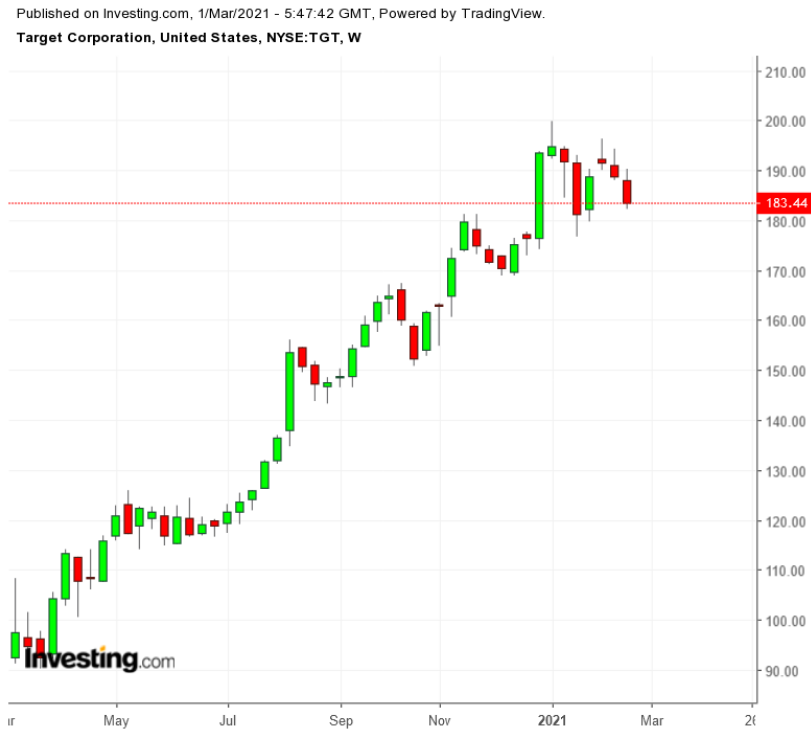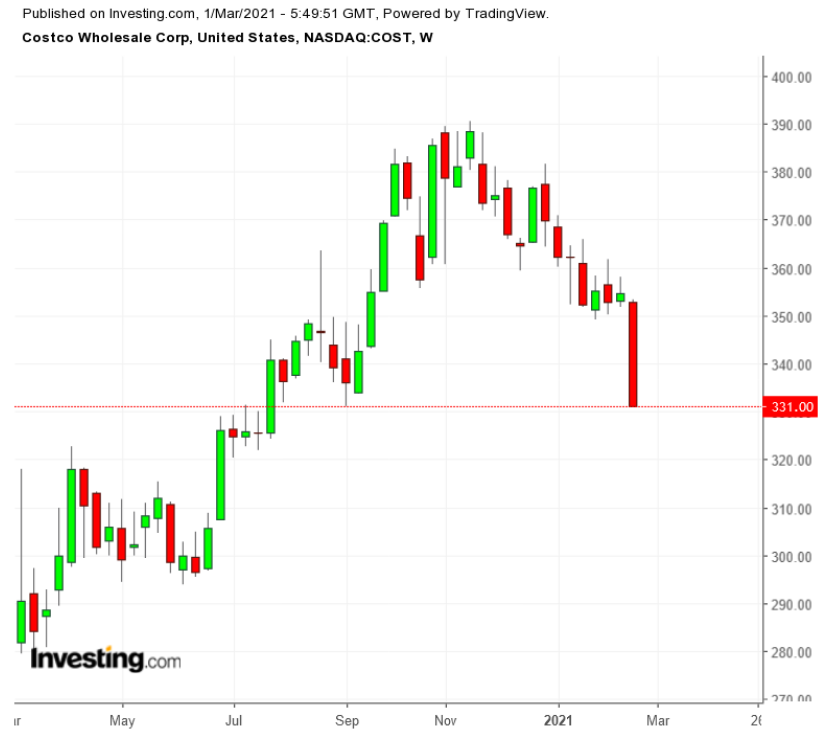The U.S.'s largest retail companies have been a favorite pick for investors who are keen to keep some defensive stocks in their portfolio. Their wide economic moats, vast brick-and-mortar empires and increasing dividend payouts have provided safety investors need during uncertain times.
If you’re seeking refuge in this unpredictable economic environment, the shares of two big-box retailers—Target (NYSE:TGT) and Costco Wholesale (NASDAQ:COST)—offer good opportunities. But which provides a better bargain after their impressive run during the pandemic? Below we take a closer look.
Target: Strong In-Store Traffic
The COVID-19 pandemic provided an unprecedented surge in sales volumes for big-box retailers as consumers stocked their panteries to avoid additional trips to stores.

But when you look at the share performances of these companies, Target stands out as a clear winner. Its stock has soared more than 70% in the past one year, far outpacing the gains its competitors have delivered.
The reason behind this strength? Minneapolis-based Target has been able to keep its store traffic strong. Many analysts believe that Target will be able to hold on to its market share gains even after the pandemic is contained.
The willingness of it customers to keep coming to Target stores is the result of Chief Executive Officer Brian Cornell’s efforts to make Target's retail outlets more attractive. He spearheaded the remodeling of hundreds of stores, introduced many affordable fashion brands and bolstered the retailer’s e-commerce offerings. During the pandemic, Target has been using its stores more as mini distribution centers for its booming digital business, to better fulfill online orders.
This restructuring helped propel sales in recent quarters that far exceeded analysts’ expectations. Target’s comparable sales rose 24% in the second quarter, the fastest pace in the retailer’s 58-year history, and almost three times higher than the average estimate.
In Q3, that measure jumped 20.7% from a year earlier, almost double the consensus estimate. The latest earnings, which are scheduled to be released on Tuesday, will likely cap a fiscal year with double-digit growth for the first time in 14 years.
With that growth momentum, investors who have invested in Target stock are also earning higher payouts each year. The company has steadily increased its dividend, which now yields 1.44%, every year for the last 49 years. At the same time, it's maintained a very conservative payout ratio of 35.65%, a level below the industry average. Its $0.68 a share quarterly dividend has grown more than 6% each year during the past five years.
Costco: A Solid Defensive Play
After reaching a record high in November, Costco stock has hit a bearish patch since then. That's caused some investors to think the best days for this stay-at-home stock are over.
The factors behind this downward move include the prospects of economic reopening which may reduce the need for pantry-loading along with the retailer’s escalating costs to fuel recent growth.

In the quarter that ended in November, Costco incurred $212 million in expenses fueled by higher wages during the pandemic. Costco said earlier this year it would pay employees an extra $2 an hour, and has been incurring higher costs related to e-commerce, too.
But Costco, in our view, is still a solid, long-term defensive play with its extensive store network and its subscription-based retail model that provides stability to its revenue.
With a substantial part of its business focused on selling merchandise at low profit margins, the warehouse shopping club has about 99 million members. In 2019, they paid the company $3.35 billion in membership fees alone. Overall, the retailer generated more than $160 billion in annual sales.
This financial strength has allowed Costco to reward shareholders with growing dividends. In November, the company announced a record $4.4-billion special distribution. On a per-share basis, that comes out to about $10 per share.
Despite Target’s recent outperformance, it’s still just catching up to Costco which returned more than 150%, including dividend during the past five years. Many analysts believe that after the pandemic, Costco will become even stronger, delivering yet more upside for savvy investors. Costco provides a $0.70-a-share quarterly payout at a current yield of 0.84%, which has grown 12.7% per year during the past five years.
Bottom Line
We like both Target and Costco. Each is a reliable defensive stock which one could buy and hold.
That said, Costco is a better buy after its recent weakness and its potential for higher dividend increases going forward. Target, on the other hand, looks more vulnerable to a correction after such a massive rally.
